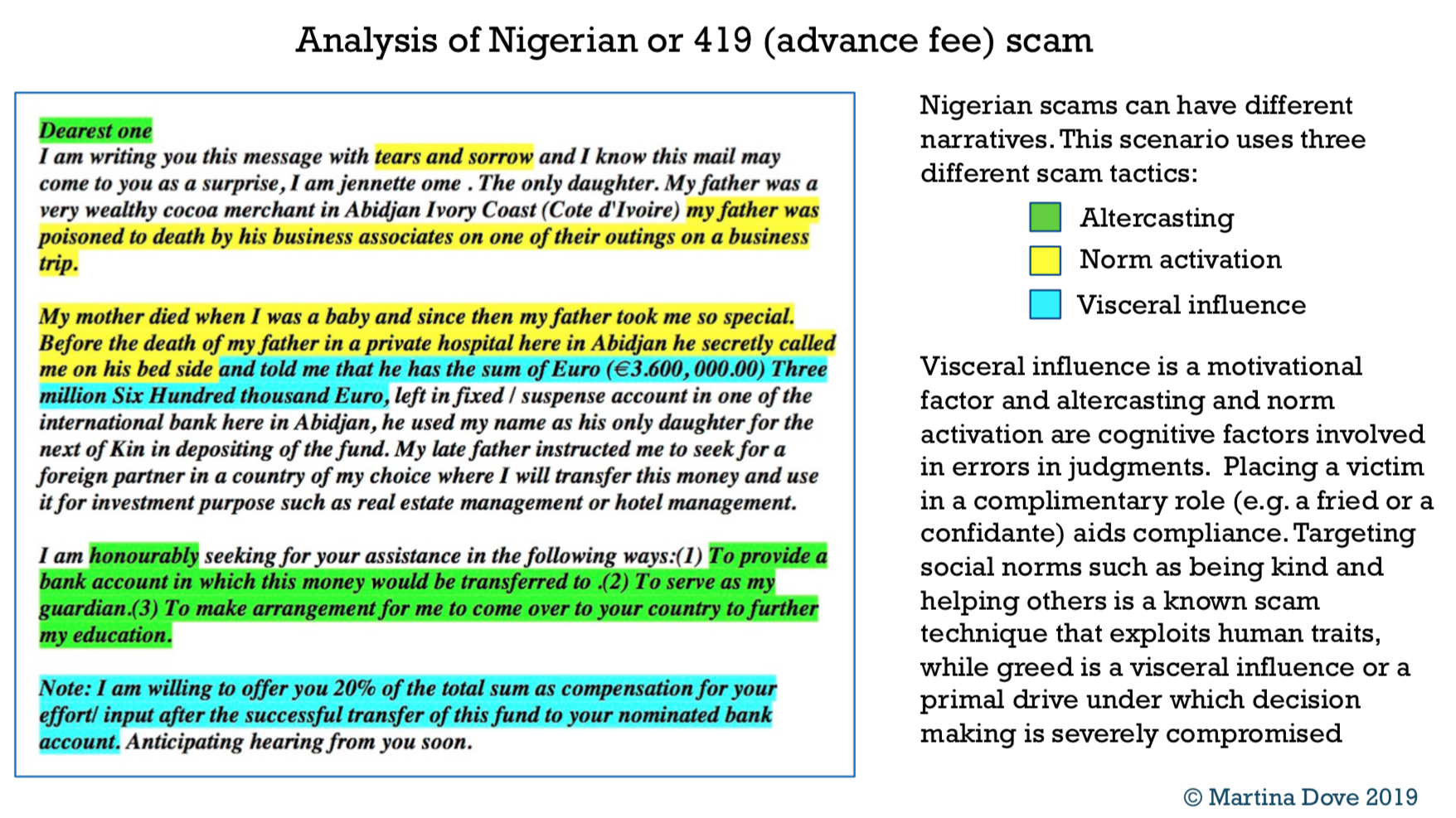Nigerian scams are still very much alive
/Nigerian or advance fee - 419 scams have been around for decades. They usually contain a story of a bank official who has spotted an account with funds that are unclaimed and needs someone to help him get the money out of the account without it being in his name. This is somewhat illegal and he needs help of someone who can receive the money in their account and be paid for it. Sometimes it is a royal person, a distant prince, rich widow unable to leave money to anyone, someone dying of cancer with wealth to give away and so on. Once the victim replies, they request conversations, befriending the victim and eventually ask for fees to process legal papers. The victim never sees the money they were promised. Worse still, sometimes the victim will receive a fake cheque and cash it, wire the money to the person that is asking them to launder money and then find out the cheque was fake after few days, losing funds they sent.
Sometimes victims are not even after money but simply believe they are helping the person as the stories are often elaborate. In the past, Nigerian scams were executed via postal means, incurring a cost to the scammer. With the invention of the fax and the phone, they became more prevalent and the Internet finally allowed them to become almost an everyday occurrence for most people while not costing much to execute. Research also stipulates that they are now so well known that they are purposely used to identify the most vulnerable victims, whose details are then sold to other scammers too.
Recently I have been contacted by someone asking me to warn about a scam purporting to be a girl from a refugee camp, but upon reading the email, I realised it was a spin off, a Nigerian type scam with a new twist to fit the current times. Briefly, the story is about a girl who is in a Syrian refugee camp and needs someone to help her get the money that her late and wealthy father deposited in the bank. This is a complex story and I decided to explain why it is complex and how it is written with a view to persuade in the future. The initial emails asks only that the victim listens to the story but even acknowledging the email might be dangerous if you are uncomfortable saying no. Here is why:
The story starts with an account how the girl lost her mother and father to a violent murder and her consequent life in a refugee camp. She prays to get out of her situation. Without explaining what she wants from the victim yet, she asks for trust and not to be betrayed and asks to know more about the potential victim. This part is likely to elicit empathy towards her situation - who would not feel empathy when someone tells you about their parents' murder. Asking to know about you is likely to induce feelings of familiarity and closeness, as if you are friends, once you share this information and people help their friends. She asks for trust and not to be betrayed. You may not think about these words at this point but when the request comes you may feel uncomfortable saying no, because you will feel as if you are betraying her, despite the doubts you might feel.
persuasive elements in Nigerian type scams
Second part tells more about her situation in the camp and the pastor who is helping her to email a random person across the globe. It also gives the pastor's telephone number. The victim will probably not use it but if they do, it will add credibility to the story. The endearments used are to evoke feelings of closeness, the mention of the secret too - we tell secrets to those we are close to so potential victim might feel privileged they were entrusted with the secret. She then explains about her father's fund that contains millions, that she cannot access and makes a request.
Scammers often put victims in a position of trust, by making themselves appear vulnerable. This gives the victim a feeling of power but in reality, the scammer holds all the strings. The girl in this story follows up by reminding you that she requested you to be trustworthy. Scammers are good at altercasting.
Altercasting, a persuasion technique, is where a person puts the victim in a specific position, often targeting the ego of the person (calling for a man of vision for example) or social norms (understanding and honest people). These types of scams often don’t ask for more than few details and for the recipient to respond to correspondence, which is also a known scam technique. Once invested, it’s harder to back out.
Microsoft research argues that Nigerian type scams are still around and purposely say they are from Nigeria because everyone knows about them. Therefore those that respond and engage with these types of scams are likely to be extremely vulnerable, which means they will, sadly, be a sure thing for a scammer. Their details are harvested and sold to other scammers who will further exploit them. If you have elderly or isolated neighbours, especially if they are not so internet savvy, talk to them about scams. Often knowing something about scams can be enough to protect from becoming a victim.

